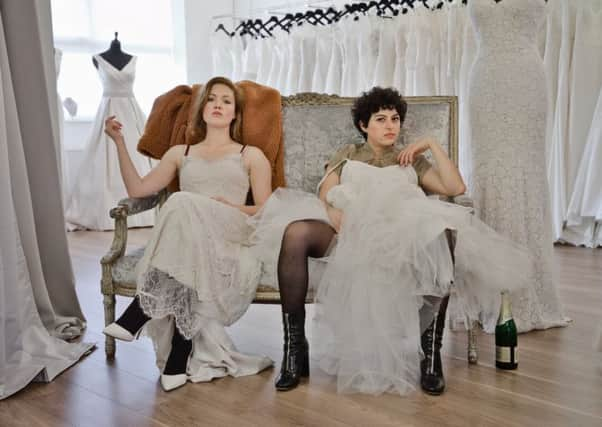Film reviews: Animals | Photograph | Holiday | Neither Wolf Nor Dog


Animals (15) **
Photograph (15) ***
Holiday (18) ****
Neither Wolf Nor Dog (12A) ***
Starring Holliday Grainger and Alia Shawkat as a couple of hard-partying best friends confronting their thirties with a determination to deny the boring realities of adulthood, Animals is the sort of film that’s so desperate to be edgy it curdles into conventionality. Running through a performative checklist of supposedly transgressive behaviour, the film revels in the collective bad behaviour of Grainger’s aspiring Dublin novelist (Laura) and Shawkat’s live-for-the-moment barista (Tyler), yet simultaneously undercuts everything that’s fascinating by using them in service of a late coming-of-age self-improvement fantasy.
That’s too bad because the film does initially seem like it might go somewhere interesting, especially as it raises the question of whether Laura, who’s been tinkering with her debut novel for close to a decade with nothing to show for it, is actually in love with writing or simply in love with the idea of being a writer. Her epic consumption of wine, her friendship with Tyler (who tries to live her life as if it’s a work of art), even the way she throws herself into an engagement with an up-and-coming classical musician, all seem like convenient distractions from the hard slog of sitting down and writing something worthwhile. In lieu of any demonstrable talent, the notebook she’s forever scribbling in even starts to seem like a Jack Torrance-like prop for someone intent on using alcoholism as a cover for creativity’s absence.
Advertisement
Hide AdAlas, while Grainger and Shawkat (so great as the pathologically narcissistic lead in the short-lived TV show Search Party) scratch at the complexities of their characters’ symbiotic friendship, the film – which is directed by Sophie Hyde and adapted by Emma Jane Unsworth from her own acclaimed novel of the same name – doesn’t seem all that interested in the messiness of having to confront those kinds of hard, depressing truths. Instead it builds to a bogus, eye-rollingly obvious happy ending, one that perpetuates the comforting millennial myth that everyone can be a creative.
Indian director Ritesh Batra (Our Souls At Night, The Sense of an Ending) returns to the Mumbai-setting of debut feature The Lunchbox for another gentle romantic drama about the strange ways love can develop. In Photograph, a dirt-poor street photographer called Raffi (Nawazuddin Siddiqui) becomes enamoured with one of his subjects when she consents to a photograph but leaves before he can give her the picture. The woman, Miloni (Sanya Malhotra), has reasons of her own for being distracted, but after being caught in a lie to his grandmother (Farrukh Jaffar) that requires him to get Miloni to pretend to be his fiancé, Raffi decides to track her down for real. Though this sounds like the starting point for the kind of retrograde, deceit-based romantic comedy that used to be ten-a-penny, that’s kind of the point. Batra embraces a few of the tropes of the genre to subtly comment on the role movies play in how we imagine our romantic lives and how we frequently act them out in less than idealistic circumstances. Though a little too elliptical to be truly satisfying, it tells a familiar story with admirable gentleness.
Gentleness is not a word that could be applied to Holiday. This stark, brutal directorial debut from Swedish born, Danish-educated filmmaker Isabella Eklöf (who co-wrote this year’s excellent Border) offers an unflinching look at contemporary power structures with a story about a young woman (Victoria Carmen Sonne) employed as a sort of professional girlfriend for a drug dealer (Lai Yde) living a life of minimalist luxury on the Turkish riviera. Kept in line by short, sharp acts of violence that are more shocking for how matter-of-factly they’re presented, Sasha (Sonne) is a complex, somewhat inscrutable protagonist. Though she seems to have accepted subservience as the price of the life of leisure she otherwise embraces, her internalisation of such abuse manifests itself in terrible and unpredictably violent ways. Stylistically recalling Austrian provocateur Ulrich Seidl (Dog Days, Import/Export) and Fat Girl-era Catherine Breillat (influences Eklöf has acknowledged), the film carves out an identity of its own with Eklöf’s detached, meticulously framed compositions reinforcing the rot beneath the film’s yacht-filled world of luxurious idleness.
Neither Wolf Nor Dog – Kent Nerburn’s journalistic, Robert Plant-endorsed mid-90s novel about Native American culture – gets an intriguing film adaptation courtesy of Scottish filmmaker Steven Lewis Simpson. Dramatising Nerburn’s efforts to better understand the Lakota people of the Dakotas as a road trip about the writing of the book, the independently shot and distributed film starts off as a rather stiff and awkward culture clash movie about who has the right to tell what stories. But as it progresses, the style and the performances gradually loosen up as Nerburn (played in the film by Christopher Sweeney) starts seeing beyond his own reverential-yet-cliché-ridden view of his subject and starts bonding properly with Dan, the charismatic 97-year-old Lakota chief whose memories he’s been summoned to document. Played by the late Dave Bald Eagle (who passed away shortly after the film was finished), he’s the life-blood of the film and Simpson makes the most of him, building to a moving, improvised scene at Wounded Knee and giving him the space and freedom to unburden himself. ■